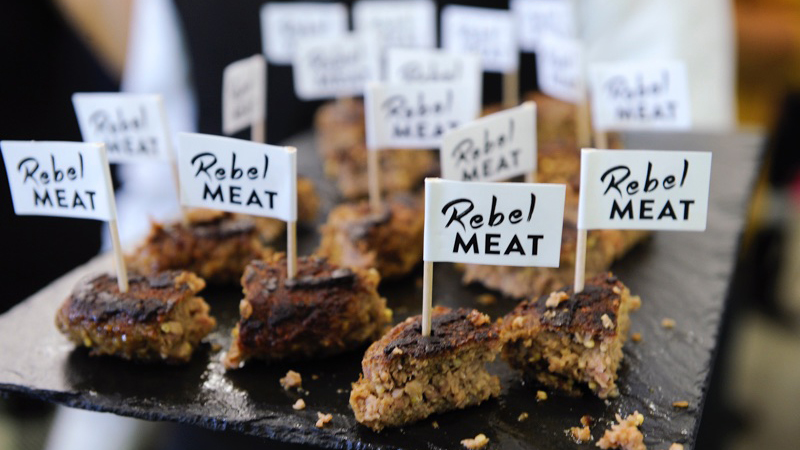After all, there is also growing interest among companies with production expertise to get involved in the cultured meat market. Over the past months, Merck, Novozymes, DSM and others are expressing a lot of interest. At events such as the yearly European Forum on Industrial Biotechnology and Bioeconomy" (EFIB) which took place in Brussels in 2019 and is planned to be held in October 2020 in Frankfurt, it’s clear that a lot of participants want to secure a piece of the pie in the attractive market.
Food experts from the
Startlife Incubator at the University of Wageningen and the Berlin-based food organisation
ProVeg International recommended cooperating strategically with manufacturers. It will be possible to reduce the consumption of animal meat by 50% by 2040 through attractive biotechnical innovations, but then scaling up production is crucial,
ProVeg Incubator head Albrecht Wolfmeyer said in Brussels. However, as Cornelia Habacher from
Rebel Meat GmbH stated at the event, companies will have to find their own individual strategies. The Austrian start-up is betting on hybrid technology and the right mix of meat and plant products. It already supplies a dozen restaurants in Vienna. We only want to work with natural ingredients, not use any additives, and establish ourselves in the market as quickly as possible, Habacher says. The right mix is our secret. The Rebel Meat patty is still made from 50% organic beef sourced in Austria. But the company is planning to replace that with cultured meat as soon as larger-scale cell culture technologies are in place. We wanted to get established in the market, and not have to wait so long for all the scaling problems to be solved by cultured meat.
Chinese investors actively investing in the space
Many experts who presented at the EFIB 2019 were convinced that biotechnology would be part of the solution. Without upstream innovations, we cannot expect products at the end of the value chain. Biotechnology is an essential driver in which we want to invest, said EFIB panelist Joseph Zhou from Chinese food tech investor Bits x Bites. In Brussels, he provided his insights on what’s happening in Asia: China is facing a major upheaval in the food sector, and we will actively invest in technologies that we consider promising for the Chinese market. For Zhou, the EFIB was a good scouting platform for new technologies. Chinese investors have already sunk funding into some companies – among them British genome editing specialist Tropic Biosciences Ltd. and Israel’s cell-based meat company Future Meat Technologies. (
see his interview here)
Incubators like that organised by ProVeg International are also now moving beyond just advising companies and into investing in them and holding their own conferences on the topic. New technologies can go a long way towards addressing the urgent challenges of the global food system in terms of climate change, environmental destruction, antibiotic resistance and public health. The future of protein is plant-based and – in the longer run – cultivated, comments Wolfmeyer. (see below for interview) Large financing rounds like those seen in the US, along with growing investment commitments from accelerators all over the globe, are also making cultured meat producers confident that the capital needed to finance costly large-scale production facilities will be available in the coming years.

Interview with Albrecht Wolfmeyer, Proveg Incubator, about acceleration of food transformation
ProVeg International promotes alternative protein solutions and supports start-ups. European Biotechnology spoke with its head Albrecht Wolfmeyer about current activities and the next event.
EuroBiotech_ProVeg’s history dates back to the 19th century, and it’s become an international food awareness organisation that is active globally. How do you perceive the state of the alternative protein market today?
Wolfmeyer_The trend is strong and sustainable. Today it’s easier than ever for consumers to choose delicious plant-based products. It’s not only young visionaries creating innovative and novel foods. We keep seeing well-established brands expanding their portfolios towards more plant-based options. Whether it’s producers, retailers or food services, all stakeholders along the value chain have recognised a change in consumer preferences, and investments have seen a steep rise. The race is on.
EuroBiotech_What are your next steps and goals with regard to supporting startups in this field?
Wolfmeyer_ Since the launch of our Incubator in 2018, we have supported more than 30 start-ups from over 15 countries. In April, we have onboarded our fourth cohort of start-ups. Due to the corona crisis, we will offer a full-fledged remote programme, with modules like fundraising, branding and product development. For the first time, all accepted start-ups will receive a €20,000 grant to boost their business, with the potential for a further €30,000-€180,000 in investment after completing the programme. Guests at the
New Food Conference in Berlin can get to know our most promising start-ups.
EuroBiotech_What is the aim of the New Food Conference that’s slated to be held from 5-6 August in Berlin?





 adobe.stock.com - ipopba
adobe.stock.com - ipopba BioDlink
BioDlink